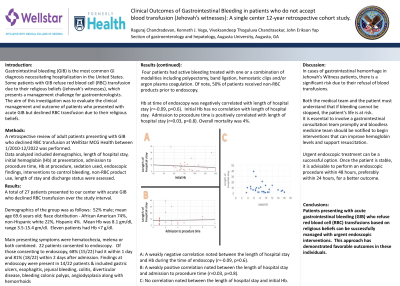Monday Poster Session
Category: GI Bleeding
P2031 - Clinical Outcomes of Gastrointestinal Bleeding in Patients Who Do Not Accept Blood Transfusion (Jehovah’s Witnesses): A Single Center 12-Year Retrospective Cohort Study
Monday, October 23, 2023
10:30 AM - 4:15 PM PT
Location: Exhibit Hall


Raguraj Chandradevan, MD
Medical College of Georgia at Augusta University
Augusta, GA
Presenting Author(s)
Raguraj Chandradevan, MD, Kenneth J. Vega, MD, FACG, Viveksandeep Thoguluva Chandrasekar, MD, John Erikson Yap, MD, MBA
Medical College of Georgia at Augusta University, Augusta, GA
Introduction: Gastrointestinal bleeding (GIB) is the most common GI diagnosis necessitating hospitalization in the United States. Some patients with GIB refuse red blood cell (RBC) transfusion due to their religious beliefs (Jehovah's witnesses), which presents a management challenge for gastroenterologists. The aim of this investigation was to evaluate the clinical management and outcome of patients who presented with acute GIB but declined RBC transfusion due to their religious beliefs.
Methods: A retrospective review of adult patients presenting with GIB who declined RBC transfusion at Augusta University Medical Center between 1/2010-12/2022 was performed (IRB#1978517-3). Data analyzed included demographics, length of hospital stay, initial hemoglobin (Hb) at presentation, admission to procedure time, Hb at procedure, sedation used, endoscopic findings, interventions to control bleeding, non-RBC product use, length of stay and discharge status were assessed.
Results: A total of 27 patients presented to our center with acute GIB who declined RBC transfusion over the study interval. Demographics of the group was as follows: 52% male; mean age 69.6 years old and race distribution - African American 74%, non-Hispanic white 22%, Hispanic 4%. Mean Hb was 8.1 gm/dl, range 3.5-15.4 gm/dl. Eleven patients had Hb < 7 g/dl. Main presenting symptoms were hematochezia, melena or both combined. 22 patients consented to endoscopy.
Of those consenting to endoscopy, 68% (15/22) had it within 1 day and 81% (18/22) within 2 days after admission. Findings at endoscopy were present in 14/22 patients & included esophagitis, gastric ulcers, jejunal bleeding, colitis, diverticular disease, bleeding colonic polyps, angiodysplasia along with hemorrhoids. Four patients had active bleeding treated with one or a combination of modalities including polypectomy, band ligation, hemostatic clips and/or argon plasma coagulation. Of note, 50% of patients received non-RBC products prior to endoscopy.
Hb during the time of endoscopy was negatively correlated with length of hospital stay (r=-0.09, p=0.6). Initial Hb has no correlation with length of hospital stay. Admission to procedure time is positively correlated with length of hospital stay (r=0.03, p=0.8). Overall mortality was 4%.
Discussion: Patients who present with acute GIB but declined RBC transfusion due to their religious beliefs can be successfully managed with urgent endoscopic intervention resulting in good outcomes.

Disclosures:
Raguraj Chandradevan, MD, Kenneth J. Vega, MD, FACG, Viveksandeep Thoguluva Chandrasekar, MD, John Erikson Yap, MD, MBA. P2031 - Clinical Outcomes of Gastrointestinal Bleeding in Patients Who Do Not Accept Blood Transfusion (Jehovah’s Witnesses): A Single Center 12-Year Retrospective Cohort Study, ACG 2023 Annual Scientific Meeting Abstracts. Vancouver, BC, Canada: American College of Gastroenterology.
Medical College of Georgia at Augusta University, Augusta, GA
Introduction: Gastrointestinal bleeding (GIB) is the most common GI diagnosis necessitating hospitalization in the United States. Some patients with GIB refuse red blood cell (RBC) transfusion due to their religious beliefs (Jehovah's witnesses), which presents a management challenge for gastroenterologists. The aim of this investigation was to evaluate the clinical management and outcome of patients who presented with acute GIB but declined RBC transfusion due to their religious beliefs.
Methods: A retrospective review of adult patients presenting with GIB who declined RBC transfusion at Augusta University Medical Center between 1/2010-12/2022 was performed (IRB#1978517-3). Data analyzed included demographics, length of hospital stay, initial hemoglobin (Hb) at presentation, admission to procedure time, Hb at procedure, sedation used, endoscopic findings, interventions to control bleeding, non-RBC product use, length of stay and discharge status were assessed.
Results: A total of 27 patients presented to our center with acute GIB who declined RBC transfusion over the study interval. Demographics of the group was as follows: 52% male; mean age 69.6 years old and race distribution - African American 74%, non-Hispanic white 22%, Hispanic 4%. Mean Hb was 8.1 gm/dl, range 3.5-15.4 gm/dl. Eleven patients had Hb < 7 g/dl. Main presenting symptoms were hematochezia, melena or both combined. 22 patients consented to endoscopy.
Of those consenting to endoscopy, 68% (15/22) had it within 1 day and 81% (18/22) within 2 days after admission. Findings at endoscopy were present in 14/22 patients & included esophagitis, gastric ulcers, jejunal bleeding, colitis, diverticular disease, bleeding colonic polyps, angiodysplasia along with hemorrhoids. Four patients had active bleeding treated with one or a combination of modalities including polypectomy, band ligation, hemostatic clips and/or argon plasma coagulation. Of note, 50% of patients received non-RBC products prior to endoscopy.
Hb during the time of endoscopy was negatively correlated with length of hospital stay (r=-0.09, p=0.6). Initial Hb has no correlation with length of hospital stay. Admission to procedure time is positively correlated with length of hospital stay (r=0.03, p=0.8). Overall mortality was 4%.
Discussion: Patients who present with acute GIB but declined RBC transfusion due to their religious beliefs can be successfully managed with urgent endoscopic intervention resulting in good outcomes.

Figure: A: A weakly negative correlation noted between the length of hospital stay and Hb during the time of endoscopy (r=-0.09, p=0.6).
B: A weakly positive correlation noted between the length of hospital stay and admission to procedure time (r=0.03, p=0.8).
C: No correlation noted between the length of hospital stay and initial Hb.
B: A weakly positive correlation noted between the length of hospital stay and admission to procedure time (r=0.03, p=0.8).
C: No correlation noted between the length of hospital stay and initial Hb.
Disclosures:
Raguraj Chandradevan indicated no relevant financial relationships.
Kenneth Vega indicated no relevant financial relationships.
Viveksandeep Thoguluva Chandrasekar indicated no relevant financial relationships.
John Erikson Yap indicated no relevant financial relationships.
Raguraj Chandradevan, MD, Kenneth J. Vega, MD, FACG, Viveksandeep Thoguluva Chandrasekar, MD, John Erikson Yap, MD, MBA. P2031 - Clinical Outcomes of Gastrointestinal Bleeding in Patients Who Do Not Accept Blood Transfusion (Jehovah’s Witnesses): A Single Center 12-Year Retrospective Cohort Study, ACG 2023 Annual Scientific Meeting Abstracts. Vancouver, BC, Canada: American College of Gastroenterology.
